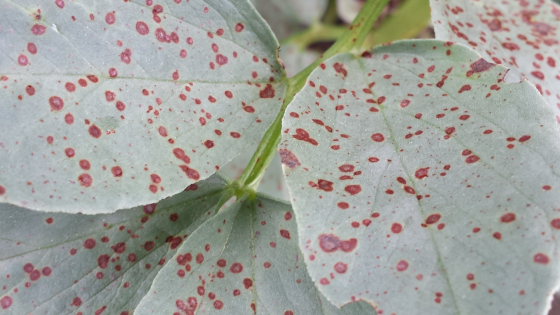Signum® is a well-proven, highly effective protectant fungicide. Containing boscalid and pyraclostrobin, Signum® provides excellent, long-lasting disease control and physiological benefits for an extremely wide range of vegetable, soft fruit and pulse crops.
Signum®
Signum® is a well-proven, highly effective protectant fungicide. Containing boscalid and pyraclostrobin, Signum® provides excellent, long-lasting disease control and physiological benefits for an extremely wide range of vegetable, soft fruit and pulse crops.
Benefits
- Maximises yield and crop quality
- Over 70 recommended crops, including label and EAMUs
- The market leading fungicide for vegetable crops
- Controls all the major diseases in peas and beans and provides the best return on investment compared to a farm standard programme*
- Provides physiological benefits from both boscalid and pyraclostrobin, resulting in increased green leaf retention throughout the season and reduction of stress
| Label | |
|---|---|
| Safety data sheet | |
| BASF Compatibility List |
Product Details
| Active ingredient(s) | 267 g/kg boscalid and 67 g/kg pyraclostrobin |
| Formulation | Water dispersible granule (WG) |
| Pack size | 2.5 kg in outers of four |
| Crops | Broccoli, Brussels sprout, cabbage, calabrese, cauliflower, carrots, combining and vining peas, field beans, lettuce (outdoor and protected), potatoes, blackcurrants, redcurrants and whitecurrants (each outdoor, pre- and post-harvest) and strawberry (outdoor and protected) |
| Disease activity | Alternaria, blackspot, Botrytis, chocolate spot, leaf and pod spot, powdery mildew, Rhizoctonia, rust, Sclerotinia, white blister (for full list and levels of control see label) |
| Maximum individual dose: Broccoli, Brussels sprout, cabbage, calabrese, cauliflower, carrots, combining and vining peas, field beans | 1.0 kg per hectare |
| Maximum individual dose: lettuce (outdoor and protected) and blackcurrants, redcurrants and whitecurrants (each outdoor, pre- and post-harvest) | 1.5 kg per hectare |
| Maximum individual dose: potatoes | 0.25kg per hectare |
| Maximum individual dose: strawberry (outdoor and protected) | 1.8 kg per hectare |
| Maximum total dose: Broccoli, Brussels sprout, cabbage, calabrese, cauliflower, lettuce (outdoor and protected) | 3.0 kg/ha/year |
| Maximum total dose: carrots, combining peas and field beans | 2.0 kg/ha/crop |
| Maximum total dose: potatoes and vining peas | 1.0 kg/ha/year |
| Maximum total dose: blackcurrants, redcurrants and whitecurrants (each outdoor, pre-harvest) | 3.0 kg/ha/year |
| Maximum total dose: strawberry (outdoor and protected) | 3.6 kg/ha/year |
| Latest time of application: Broccoli, Brussels sprout, cabbage, calabrese, cauliflower, carrots, lettuce (outdoor and protected), vining peas | 14 days before harvest |
| Latest time of application: Combining peas and field beans | 21 days before harvest |
| Latest time of application: blackcurrants (outdoor, pre-harvest) (not applicable post-harvest) and strawberry (outdoor and protected) | 3 days before harvest |
| Water volume | Varies by crop – see label |
| Aquatic buffer zone | LERAP B (also Broadcast Air-assisted LERAP) |
| Processed crops | Consult processors before use on crops destined for processing. Tests have indicated that no taints were detected in blackcurrant juice, quick frozen or canned vining peas and canned combining peas. |
| Other specific restrictions | Applications to lettuce must only be made between 1 April and 31 October. |
Product Overview
| Active ingredient(s) | 267 g/kg boscalid and 67 g/kg pyraclostrobin |
| Formulation | Water dispersible granule (WG) |
| Pack size | 2.5 kg in outers of four |
| Crops | Broccoli, Brussels sprout, cabbage, calabrese, cauliflower, carrots, combining and vining peas, field beans, lettuce (outdoor and protected), potatoes, blackcurrants, redcurrants and whitecurrants (each outdoor, pre- and post-harvest) and strawberry (outdoor and protected) |
| Disease activity | Alternaria, blackspot, Botrytis, chocolate spot, leaf and pod spot, powdery mildew, Rhizoctonia, rust, Sclerotinia, white blister (for full list and levels of control see label) |
| Maximum individual dose: Broccoli, Brussels sprout, cabbage, calabrese, cauliflower, carrots, combining and vining peas, field beans | 1.0 kg per hectare |
| Maximum individual dose: lettuce (outdoor and protected) and blackcurrants, redcurrants and whitecurrants (each outdoor, pre- and post-harvest) | 1.5 kg per hectare |
| Maximum individual dose: potatoes | 0.25kg per hectare |
| Maximum individual dose: strawberry (outdoor and protected) | 1.8 kg per hectare |
| Maximum total dose: Broccoli, Brussels sprout, cabbage, calabrese, cauliflower, lettuce (outdoor and protected) | 3.0 kg/ha/year |
| Maximum total dose: carrots, combining peas and field beans | 2.0 kg/ha/crop |
| Maximum total dose: potatoes and vining peas | 1.0 kg/ha/year |
| Maximum total dose: blackcurrants, redcurrants and whitecurrants (each outdoor, pre-harvest) | 3.0 kg/ha/year |
| Maximum total dose: strawberry (outdoor and protected) | 3.6 kg/ha/year |
| Latest time of application: Broccoli, Brussels sprout, cabbage, calabrese, cauliflower, carrots, lettuce (outdoor and protected), vining peas | 14 days before harvest |
| Latest time of application: Combining peas and field beans | 21 days before harvest |
| Latest time of application: blackcurrants (outdoor, pre-harvest) (not applicable post-harvest) and strawberry (outdoor and protected) | 3 days before harvest |
| Water volume | Varies by crop – see label |
| Aquatic buffer zone | LERAP B (also Broadcast Air-assisted LERAP) |
| Processed crops | Consult processors before use on crops destined for processing. Tests have indicated that no taints were detected in blackcurrant juice, quick frozen or canned vining peas and canned combining peas. |
| Other specific restrictions | Applications to lettuce must only be made between 1 April and 31 October. |
Why Signum?
For well over a decade, UK growers have been protecting their vegetable and pulse crops with Signum® and getting the same consistent results of improved yield, greater flexibility in application timing, and protection across a broad range of diseases.
The product of choice for peas and beans
Long-lasting disease control

Disease threats at T1
Botrytis - chocolate spot in beans and grey mould in peas - is the most important target to consider at early-mid flowering.
Signum® is recognised as being the best product to control Botrytis in peas and beans (best results from preventative applications), protecting early flowers and pods and helping to maximise yield.
Disease threats at T2
At mid to late-flowering, rust tends to be the main consideration but Botrytis (chocolate spot in beans, grey mould in peas) will continue to cause problems if conditions are favourable.
Signum® keeps on top of chocolate spot and grey mould, whilst also protecting against rust and Sclerotinia, and prolonging green leaf area for maximum yield.
Maximises yield
PGRO bean trials in 2014 (a high chocolate spot pressure year), found that Signum® gave the best yield response, increasing yield by 17% versus untreated. In comparison, Alto Elite (chlorothalonil + cyproconazole) gave a 3.5% yield uplift versus the untreated.
BASF bean trials, conducted by OAT and PGRO in 2020 (a low chocolate spot and high rust pressure year), found that Signum® gave an average yield increase of 20% versus the untreated.
In a BASF pea trial, conducted by OAT in 2020, Signum® achieved a 27% yield uplift versus the untreated.
Effective disease control from Signum® is a key driver for these yield uplifts but the other is the physiological benefits that boscalid and pyraclostrobin provide, such as increased greening.
Physiological benefits
Both boscalid and pyraclostrobin have been proven to provide physiological benefits across a range of crops that maximise yield and quality, most notably:
- Increased retention of green leaf
- Reduction of stress
Best return on investment
In beans, Signum® delivered more than a £100 margin over fungicide costs, £30/ha greater than a farm standard programme*
In peas, Signum® delivered a £66/ha increase in margin over fungicide costs compared to a farm standard programme**
*Based on two winter bean trials by PGRO and OAT in 2020 comparing two applications of Signum® at 0.5t/ha with two applications of azoxystrobin plus tebuconazole. Mean untreated yield of 4.2t/ha. No chocolate spot present. Beans price based on £200/t.
**Based on one combining pea trial by OAT in 2020 comparing one application of Signum® at 0.75t/ha with one application of azoxystrobin plus metconazole. Mean untreated yield of 2.82t/ha.
Getting the most from Signum®
Application should be made before disease is visible in the crop in order to prevent disease establishment and promote improved yield and quality.

